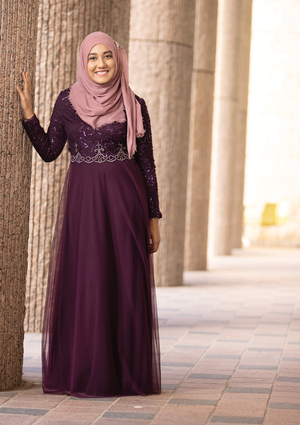Labiba Uddin, a 2021 Wakeland High School graduate, appears destined for great things. Valedictorian of her class, a Presidential Scholar — the first ever selected from Frisco ISD — and Harvard-bound later this month, the teen has achieved a lot at a young age. </p
p>But in a way, she’s just living up to her name.</p
p>“The word Labiba literally means intelligent” in Arabic, explained Aishah Uddin, her older sister. “She’s a real reflection of her name, and she’s been like that ever since we were young.” </p
p>Indeed, 17-year-old Labiba’s intellect was recognized with one of the most-prestigious awards a high school student can receive. Established in 1964 by executive order of President Lyndon B. Johnson, the Presidential Scholar award recognizes high school seniors with outstanding academic, leadership and community- and school-service achievements. As many as 161 students annually are named Presidential Scholars. </p
p>Students must be invited to apply for the award and nominated by the chief state school officer to qualify for consideration. Prior to receiving a nomination, Labiba said the award was not even on her radar. “I actually didn’t know much about it until I was nominated.” However, “I feel blessed beyond words” to have received the award, she said. </p
p>While some students are selected for the honor given their creative or technical achievements, the majority are chosen for their exceptional academic performance. “Knowing the significance of that award, and the fact that one of [Frisco ISD’s students] was selected was just an amazing accomplishment,” said Cathy Toups, a Wakeland biology teacher and Academic Decathlon coach. “We’re very proud.”</p
p>The award is just one example of Labiba’s exceptionalism. While at Wakeland, she also earned several medals as an Academic Decathlon participant. </p
p>Academics aside, faith has played a central role in Labiba’s life from an early age. In fourth grade, her parents withdrew her from public school so that she could dedicate time to memorizing the entirety of the Quran (about 600 pages) in Arabic. </p
p>From fourth through sixth grade, Labiba homeschooled online through Connections Academy while simultaneously attending a Hafiz program at a mosque in Plano. Men and women who successfully memorize the Quran are respectfully known as Hafiz or Hafiza. For Labiba to become a Hafiza was a significant achievement. “She was the first person who memorized the whole Quran in our family,” her mother, Lipi Akter, said. </p
p>Dr. Khalil Abdur-Rashid was one of Labiba’s teachers at the Islamic Center in Plano where she studied the Quran. Since then, he has become a Muslim chaplain at Harvard University, as well as an instructor of Muslim studies at Harvard Divinity School. Labiba said she looks forward to reconnecting with her former mentor when she arrives at Harvard, where she plans to study molecular and cellular biology, as well as Arabic. </p
p>As a student at Wakeland, Labiba also ran her own online tutoring company, Online Tutors 4 Success. She got her start as a tutor during middle school at a local Kumon tutoring center, where she left such an impression that she was invited to become a tutor. She started her own tutoring company in 2019 to build closer connections with students. After gaining some online tutoring experience, she created a tutoring website with her sister. </p
p>“I teach (grades) K through 12 math and science, as well as SAT and ACT (prep). My sister teaches language arts,” Labiba said. When she gets to Harvard, she plans to continue tutoring students to the extent that her studies will allow.</p
p>When asked what motivates her, Labiba’s dedication to her faith shines through. “I would sum it up in one word, which is 'Ihsan.'” The Arabic word “basically means excellence. It’s about striving to be the best version of yourself.” </p
div class="image-medium image-align-left">
Ihsan is about more than individual achievement. It’s also a matter of doing right by one’s community in both deed and action. Labiba’s family said she is motivated most by her desire to help others. “It’s the biggest part of her character,” her mother said, “but it’s also her biggest weakness. If someone asks her for help, she cannot say no.”</p
p>The teen’s passion for giving back is perhaps best exemplified by Lateef Refugee Relief, the nonprofit organization she founded in 2019 with her sister, Aisha, and a friend. It provides direct material assistance to refugees who have relocated to North Texas. They organized monthly food and essential goods drives through their mosques and on the internet. </p
p>“It’s not easy to be on your own in a completely new land,” Labiba said of the plight of refugees. “It’s important to build up others around us while we continue to build ourselves up.”</p
p>Although Labiba won’t be able to assist the organization firsthand after she leaves for college, she said family and friends plan to carry on its work. She also hopes to join similar initiatives in Massachusetts.</p
p>The experience of refugees in need hits close to home for Labiba and her family. Although she was born in Texas, her parents are from Bangladesh. When her father came to the U.S. to study at the University of North Texas, he relied on the generosity of the family of a student he had tutored to pay for his plane ticket. </p
p>“Having parents that are immigrants really solidified who I am and inspired me from a young age to put in my all,” Labiba said. “I’m grateful for the risk they took for us.”</p
p>Like many young people, Labiba wasn’t always so steadfastly confident in her identity. In middle school, she said, “A lot of times in class, I would feel isolated.” When she got to high school, she recalls being more shy and reserved than she is now. Over time, her confidence rose, especially through her participation in Academic Decathlon. Ms. Toups described the teen as having been “an extremely strong and top performer. … She’s got a natural curiosity about her and she thinks very deeply about things.”</p
p>Labiba said Academic Decathlon made her feel at home in her intellect. “It felt really great to be in a community where people were passionate about learning, but that it didn’t have to be something that ostracized them from the rest of the student population.” She medaled at the state-level Decathlon competition her freshman year. “From there, I just felt so much better about myself. … Not that your score should define you, but it helped give me confidence.”</p
p>In summer 2020, she applied and was selected to be a Texas Bluebonnet Girl through the American Legion Auxiliary. “It was basically a week-long intensive to help girls understand the political makeup of the United States and why it’s important to get involved in your community,” she explained. “It helped me feel like I could make an impact.”</p
p>Public health is one of Labiba’s greatest interests. She has already taken on a six-week summer fellowship with the Health and Policy Analysis Team, a public health literacy and advocacy organization started by students at Harvard and Columbia Universities. When she arrives at Harvard, Labiba plans to take the pre-med track. </p
p>Despite being so accomplished and driven, Labiba maintains a sense of humility. Ms. Toups said, “She can be very humble in that she doesn’t think she knows everything and is still willing to learn.”</p
p>Labiba attributes her personal accomplishments not to herself, but to “my family, my friends, my teachers and even the broader community. Whether they know or not, they helped me get to this point,” she said. “My accomplishments are not mine. They are theirs.”






